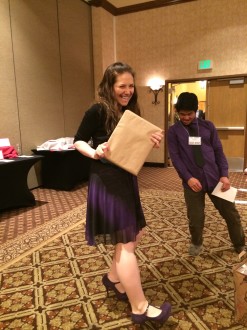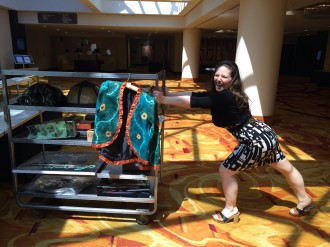 Picking up from last time –
Picking up from last time –
I’ve learned a number of things that I think would be helpful if I were a volunteer coordinator.
1) When you offer food, get more of whatever the vegetarian option is. Places often seem to run out of it. Meat eaters are free to eat the vegetarian option if there’s too much, but it doesn’t work the other way around.
2) While we’re on the subject of food, healthy options are wonderful! It’s lovely when carrots are set out. People running on healthy food will do better work, but you’d be surprised at how many places (even places that have something to do with health) have cookies as a main snack. (I don’t want to sound unappreciative about food. These are just takeaways I have.)
3) Appreciate your volunteers. I can tell you off the top of my head the organizations that sent me a thank you card (Western Justice Center and Hope University), because an actual thank you card in the mail really stands out.
American Bone Health handed out Certificates of Appreciation at their event. That was almost a little silly for one day of work (though they did ask us to watch a lot of presentations beforehand, so maybe that’s why).
4) Speaking of presentations, think about what you can really expect from your volunteers. If people volunteer to work for a few hours on one Saturday, they are most likely not going to want to watch presentations that total more than that amount of time. (And for the Bone Health thing, we didn’t even need all that extra information. And that’s not the only place that expected something like that (with little gain for the volunteers).)
I love information. Information is wonderful. (And ultimately, I guess I really would err on the side of too much as opposed to not enough. So, I can’t super complain about this one…) But people can only take so much information (especially before an event they’re barely involved in, when they’re not thinking much about it).
So, try to maybe be a little careful as you walk the delicate line between telling volunteers everything they’d want to know, and too much. Email enough reminders so people don’t forget, but not so many that they feel overwhelmed. (People are emailed a lot in life.)
 It’s helpful to include important information (date, time, location) in bold.
It’s helpful to include important information (date, time, location) in bold.
Things that are interesting or clear to see (charts, graphs, spreadsheets, infographics, or even nicely laid out emails) are easier to scan and take in than big pages of information barely broken up.
5) If you have to overbook your volunteers (as you most likely will), personally, I think it’d be nice to tell them they’re the overbooked group. At least they’ll know what they’re getting into, and can try to come somewhat prepared with a book or something.
Or even better yet – have some kind of project you need done. There *has* to be something the extra people can do – take pictures of everyone who’s working so you can have stuff for your social media presence, organize files on your computer that no one’s gotten around to, make spreadsheets of some sort. Every organization has to have some work that needs to be done, right? So, it boggles my mind when I’m told there’s nothing to do…
6) (And this is sort of just a nice bonus) Tell some interesting facts. The Los Angeles Food Bank had a video with interesting statistics in it. Operation Gratitude told us how many care packages we’d made by the end of the day (and they had awesome food trucks outside – though that does go against my fight for healthy eating at the beginning ;)).
Those are the takeaways I can think of. Can any of you who volunteer a lot think of any more?